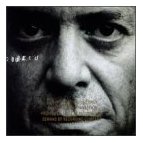|
Contents » Cover | ||
|
Reviews
At first glance, it may seem an unlikely stretch to review a musical album as "poetry," especially when the album in question is a live one that consists almost entirely of previously released and/or printed material. But when the album in question is by Lou Reed, the rules change: not only is he one of America's greatest living song writers but, like his contemporaries Bob Dylan and Leonard Cohen, he intends his lyrics to be considered as poetry, publishing them in book form and delivering varying interpretations of them at poetry readings (as evidenced on the recent PBS documentary). And in the context of a "live" album, sparsely recorded in an acoustically-based single take, a different element is involved though the musical idiom and vocal inflections, not dissimilar to, say, Allen Ginsberg's later recordings of his own poetry with occasional musical accompaniment. I'm on record in these pages suggesting that Reed is one of the three or so most important active American poets, and the present release gives me no reason to revise that opinion, even though the album is markedly different in focus from most of Reed's other work and his interpretations of his early classics are deliberately different in tone and in form than the originals. The fifteen songs are taken from all stages of Reed's thirty-plus year career, from the early Velvet Underground through the solo "Transformer" phase to the most recent album Set the Twilight Reeling (1996); also included are three songs from Reed's 1997 collaboration with composer Robert Wilson for the musical Time Rocker, which were originally written by Reed for other voices and are recorded here by the man himself for the first time. On one level, this album can be seen as something as a retrospective, as it lacks the thematic coherence of 1989's New York (arguably Reed's single greatest artistic achievement) or the razor-sharp focus of the very poetic Magic and Loss (1992), which Reed performed at numerous poetry readings at the time and which is strangely not represented on the present album. But in a rather postmodern sense, it is Reed's reworking of his early classics that creates new texts and which gives his work as a whole a different shade of meaning and point of reference: the album is not "mellow" as some reviewers have described it, but rather a deliberate act of revision by which the artist both comes to terms with his past work and transcends it. Reed's seriousness is underscored by his wise omission of obvious warhorses from his canon such as "Heroin," "Sweet Jane," "I'm Waiting for the Man," and "Walk on the Wild Side," all of which he has made something of a habit of distorting almost beyond recognition in concert in recent years or performing ironically (like Robert Plant's constant references to the "hey baby" riffs of "Black Dog" in his/Jimmy Page's performances) and which have been covered by everybody and their sister since their first release. Reed here regains control of such songs as "I'll Be Your Mirror" which had been sung by Nico in the first place; he opens the set with it, in fact, and treats it gently and masterfully, from a Pentangle-like acoustic intro followed by a tone of searing honesty, and follows it with "Perfect Day," another VU classic he performs in the same vein. Reed's at his best in renditions of such early classics as "Vicious," with its arch tongue-in-cheek tone, and "The Kids," with its straight-on intensity, delivered with an honesty that suggests Reed sees the narrator as participant in the societal problems, not above or overly detached from them. The three new songs are among the least successful tracks: in "Talking Book," for example, one gets the impression Reed isn't quite sure how to place his ethos of "Busload of Faith" or "Kicks" into almost "strange" material. "Into the Divine" is the best of the three, looking back to the Magic and Loss period, and is actually better than the readings of "Sex With Your Parents" and "Dirty Blvd," which close the performance with rather half-hearted versions of two of Reed's strongest recorded songs. But the song selection is well-chosen, including the underrated "Riptide" and dispensing with the occasional lyrical trifles Reed's been known to mix in with some of his best work. The album as a whole shows that aging "rockers" can take old material to new levels of relevance by a marked change in tone or phrasing, and that the result need not be rehash but a different poetry altogether.
|
|||||
